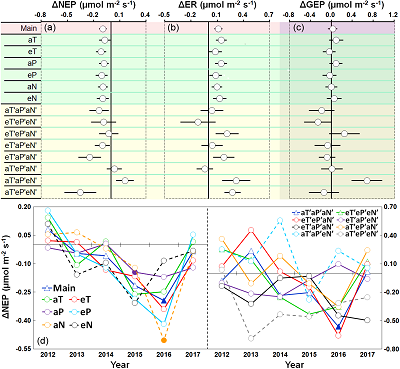On January 4, 2019, the research results of Professor Wan Shiqiang's research group in the field of global change and carbon cycle were published in Ecology Letters with the title "Elevated CO2 does not stimulate carbon sink in a semi-arid grassland". The first author of the research paper is Jian Song, a former doctoral student at the Global Change Ecology Laboratory, and the corresponding author is Professor Wan Shiqiang.

Link to paper: https://onlinelibrary.wiley.com/doi/10.1111/ele.13202
It is already a widely accepted hypothesis that atmospheric CO2 enrichment increases terrestrial carbon sinks (CO2 fertilization effect), especially in arid and semi-arid regions. However, there is still considerable uncertainty in the prediction of the effects of CO2 fertilization, especially given the interaction of CO2 enrichment with several other drivers of global change, such as climate warming, changing rainfall patterns, and atmospheric nitrogen deposition. In this study, a four-factor (CO2, temperature, rainfall, and nitrogen availability) experiment was performed in a semi-arid grassland in Inner Mongolia, China, to examine how the combination of global change drivers affects the effect of CO2 fertilization when it occurs. The results showed that CO2 enrichment did not affect total ecosystem productivity or ecosystem respiration, and therefore did not change the net ecosystem productivity of this semi-arid grassland, either without changing or increasing temperature, rainfall and nitrogen availability. The neutral response of net ecosystem productivity to CO2 enrichment is mainly due to the increase in soil carbon emissions caused by CO2 enrichment, which offsets ecosystem carbon uptake. The findings of this study suggest that semi-arid ecosystems may not be as sensitive to CO2 enrichment as expected in previous studies, and highlight the urgent need to integrate the mechanisms found in this study into the carbon cycle model of the IPCC (Intergovernmental Panel on Climate Change) assessment report to more accurately predict terrestrial carbon sinks and their responses to climate change.
This paper is the second time that Professor Wan's research group has published original research results with significant impact in Ecology Letters. Professor Wan's research group has successively published in Nature Geoscience, Global Change Biology, New Phytologist, Functional Ecology, Agricultural and Forest Meteorology, Soil Biology & Biochemistry, focusing on the response of terrestrial ecosystem carbon cycle to climate change and its feedback. A series of papers have been published in journals such as Plant and Soil, which has enhanced the international influence of the ecological discipline.

